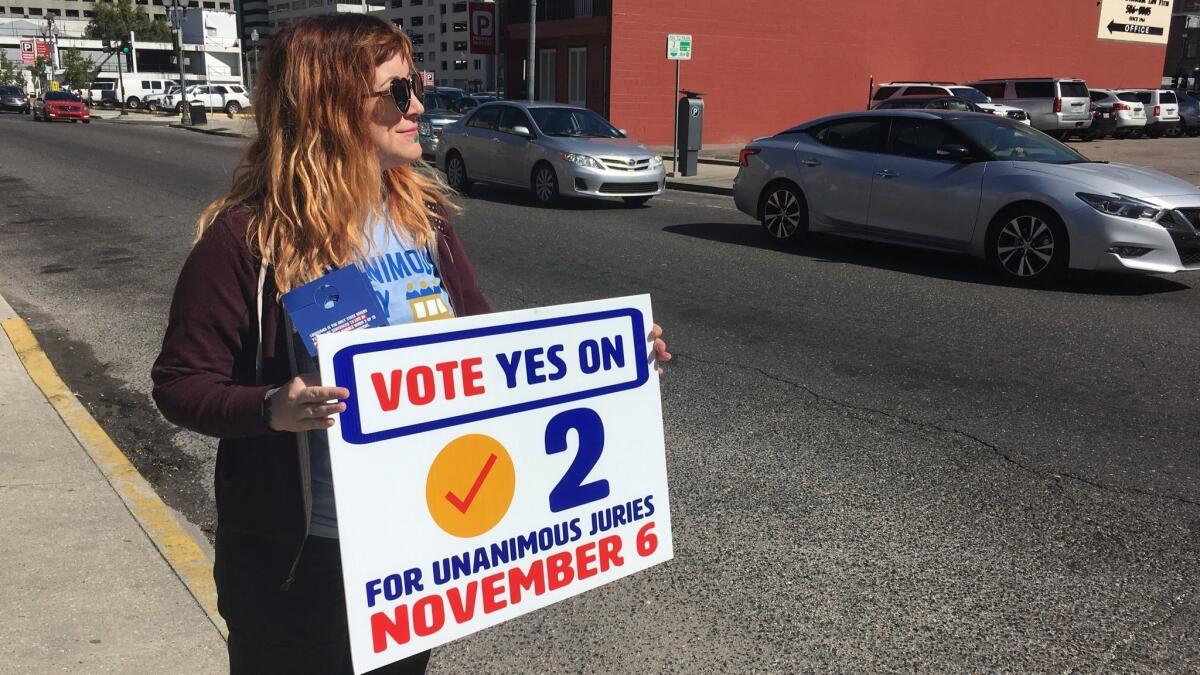From ex-felon voting rights to police shootings, criminal justice is on the ballot

- Share via
At recent campaign rallies, President Trump has said that “law and order” is a key issue in Tuesday’s midterm election, declaring to his fervent supporters that his administration is tough on crime.
But Trump’s rhetoric doesn’t necessarily match the type of referendum questions that will be on ballots. In states across the U.S., major criminal justice reform will be up for votes, with several that polls show have a high chance of passing.
The proposals include measures that would restore voting rights of ex-felons in Florida, eliminate non-unanimous criminal juries in Louisiana and make it easier to prosecute police shootings in Washington state. Many races, including those for governor in Florida and Georgia, have also pitted pro- and anti-criminal-justice-reform candidates against each other.
“There is really a dissonance between the rhetoric on the federal level and what is actually happening in the states,” said American Civil Liberties Union deputy national political director Udi Ofer. “What we are seeing is a buildup from many years of criminal justice reform making a breakthrough locally.”
Here are a few of the major criminal justice measures due to be decided Tuesday, mainly through ballot initiatives.
Florida
Florida is one of three states where nearly all people convicted of felonies lose the right to vote even after they have completed parole or probation. In most other states, those convicted of felonies have voting rights restored after leaving prison or completing periods of parole and probation. Florida’s Amendment 4, which needs 60% of votes to pass, would give voting rights to as many as 1.5 million ex-felons in the state. The law would not apply to people convicted of murder or sex crimes. Polls indicate it will pass.
Louisiana
In federal courts and 48 states, juries in felony cases must reach unanimous verdicts. Not in Louisiana, where criminal juries can come to non-unanimous decisions. The state enacted the law in 1880 after the passage of the 14th Amendment, which gave freed slaves the right to vote and serve on juries. At the state’s 1898 constitutional convention, lawmakers wrote the rule into the state constitution to “perpetuate the supremacy of the Anglo-Saxon race in Louisiana.”
If Amendment 2 passes, it will leave Oregon as the only state in the country that allows split juries in criminal trials. The amendment has drawn wide support from Democrats and Republicans.
Washington
Washington is one of the hardest states in which to prosecute police officers in deadly shootings. Current law says police can not be found liable for using deadly force if they did it “without malice and with a good faith belief that deadly force is justifiable.”
If Initiative 940 passes Tuesday, the 1986 law’s malice standard would be removed. It would be replaced with a test that asks whether a “reasonable” officer would use deadly force and whether the officer “in good faith believed that the use of deadly force was warranted.” The potential new law would mandate that shootings and other deadly uses of force go under independent investigation by people outside the police departments in question. It would also make police receive training in de-escalation and mental health issues in regard to crime suspects.
Colorado
Similar to the U.S. Constitution, the state’s constitution bans slavery and involuntary servitude “except as a punishment for crime.” Amendment A would take away that exception.
Ohio
Up for vote is Issue 1, which would make all drug possession a misdemeanor instead of a felony. Supporters say it would decriminalize addiction and allow the state to use its budget to treat addicts instead of sending them to prison. Opponents say it’s too lax on drugs. They say the possibility of a felony conviction is a good deterrent for drug use.
Marsy’s Law
This victims’ rights proposal will be voted on in Nevada, Oklahoma, Florida, Kentucky, Georgia and North Carolina. The law would expand the definition of a victim to include “any spouse, parent, grandparent, child, sibling, grandchild or guardian” of a person targeted by a crime. Proponents say it would improve the treatment of victims’ families by allowing them to receive fuller information on criminal proceedings. Opponents say it would take away resources from criminal investigations and victims more directly affected by crimes.
Marijuana
The national trend of marijuana legalization could continue Tuesday, as voters in Michigan, North Dakota, Utah and Missouri decide on marijuana-related measures. In Michigan and North Dakota, recreational legalization is on the ballot. Utah and Missouri voters will decide on legalization for medical uses.
More to Read
Sign up for Essential California
The most important California stories and recommendations in your inbox every morning.
You may occasionally receive promotional content from the Los Angeles Times.











